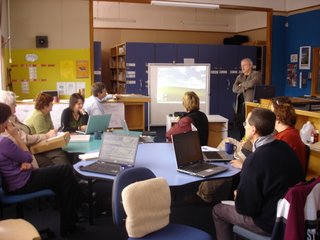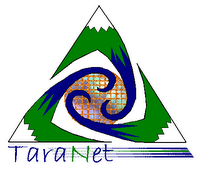
The PD focus for our leadership workshop today was
asTTLe. Thanks to Kelvin & Richard for leading this session :-)
A Point to Ponder for me is the learning conversations we engage in when we work together using this tool as being more powerful than the simple use of the tool itself. That was evident today as the team discussed their experiences within their own schools that had been the result of using asTTLe.
Something about asTTLe that I didn't know about was a part of the programme that links online to a trail of learning resources that were were directly targetted at the next steps learning intentions as identified by the asTTLe results. Very cool.
"What data are we collecting and what has changed in teacher practice and children’s learning as a result of the data collected? and
If it has changed … how do you know?"
Kelvin's notes can be found on Interact (you need your Log On to access or contact Kelvin for a copy)
"Assessment Tools for Teaching and Learning (He Pūnaha Aromatawai mō te Whakaako me te Ako). It is an educational resource for assessing literacy and numeracy (in both English and Māori) developed for the Ministry of Education by the University of Auckland.
asTTle provides teachers, students, and parents with information about a student's level of achievement, relative to the curriculum achievement outcomes, for levels 2 to 6 and national norms of performance for students in years 4 to 12.
asTTle is a tool that operates in both personal computer (PC) and Mac environments. Teachers can use asTTle to create 40-minute paper and pencil tests designed for their own students' learning needs. Once the tests are scored, the asTTle tool generates interactive graphic reports that allow teachers to analyse student achievement against curriculum levels, curriculum objectives, and population norms. Research and development over 2003–2004 has extended asTTle into years 8–12 and curriculum levels 5–6.
The asTTle CD-ROM is available to New Zealand schools free of charge. The latest version (asTTle V4) of the asTTle CD-ROM can be ordered by completing the order form on this website. http://www.tki.org.nz/r/asttle/orderform_e.php"
 I've just been in Derek's workshop "Web 2.0 and the School LMS? What's the connection?" A great introduction to 'web 2.0' but though i know all that stuff i just love listening to Derek because he always reminds me 'it's all about the kids!!!' And there are no better kids than our own to illustrate that point. I would just like to know tho how I could get my sons to be more like his daughter and actually do homework as well as all the other stuff they do online - their multitasking abilities don't seem to stretch that far...
I've just been in Derek's workshop "Web 2.0 and the School LMS? What's the connection?" A great introduction to 'web 2.0' but though i know all that stuff i just love listening to Derek because he always reminds me 'it's all about the kids!!!' And there are no better kids than our own to illustrate that point. I would just like to know tho how I could get my sons to be more like his daughter and actually do homework as well as all the other stuff they do online - their multitasking abilities don't seem to stretch that far... 







